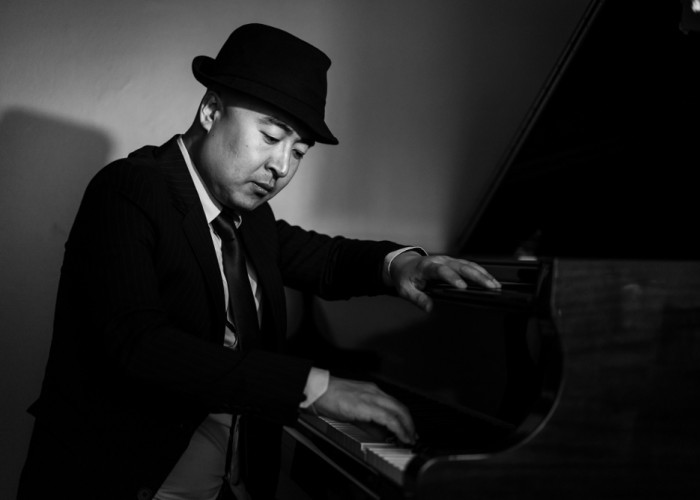Jan 13, 2026 2:09 PM
More Trump-Kennedy Center Cancellations
The fallout from the renaming of the John F. Kennedy Center for the Performing Arts to include President Donald…

Dongfeng Liu’s new album merges musical traditions from different cultures.
(Photo: Liangzi)Dongfeng Liu was born and raised in China, but always felt a deep affinity for the music of the Caribbean. On the 38-year-old pianist’s sophomore album, China Caribe (Zoho), he explores that connection in a way that perhaps no artist has before.
Fusing Chinese melodies with jazz harmonies and Latin rhythms, Liu, who wrote every song on the record, has produced a kaleidoscopic work that is global in scope, but also very much a personal document of his own interests as a musician. And the instrumentation is as varied as the source material.
Liu is joined by Min Xiaofen, on pipa and ruan, types of Chinese lutes; Feifei Yang on erhu, a bowed, two-stringed instrument; and the Hanggai Band, a Mongolian folk group. Liu’s rhythm section consists of Francis Benitez on drums and John Benitez on bass, with percussionist Roberto Quintero joining in on a few tracks.
John Benitez said the music works not only because of Liu’s unique vision, but also because Afro-Caribbean and Chinese music have more in common than it might seem.
“There are actually convergence points,” Benitez explained during a phone interview, going on to add that they both employ, for instance, pentatonic scales—a fact that is particularly apparent on “Arcadia,” a bluesy number that sounds as if it could have emerged from either culture.
According to Liu, the album is an attempt to seamlessly tie together the musical strands that he has been pulling on for more than a decade, rather than just making a record featuring Chinese melodies over swing rhythms, which he believes would have been a glib attempt at world fusion.
Liu was intrigued by jazz before he discovered Latin music, though. He heard a tape of Scott Joplin’s “Entertainer” in high school and traced the history of the music to more modern musicians like Louis Armstrong, Oscar Peterson, Miles Davis and Bill Evans. In the late 1990s, his personal piano instructor—with whom he was taking lessons on the side, while studying classical music more formally—introduced him to Latin rhythms, and he was immediately entranced by the clave, the rhythmic pattern used in Afro-Cuban music. He’d go on to spend two months in Cuba during 2010, studying Latin jazz piano and conga.
After teaching at a conservatory in Beijing for 15 years, Liu moved to New York in 2015 to get his master’s in jazz at Queens College. Although the jazz scene in China, particularly in cities like Shanghai and Beijing, now is quite vibrant, Liu said he needed to relocate in order to immerse himself in the music and to prove himself as a pianist and composer.
“I wanted to learn real jazz music,” he said matter-of-factly over green tea at his Queens condo, where he lives with his wife and son.
During pursuit of his master’s, Liu also took on some extracurricular studies. His favorite musician was—and remains—the Cuban pianist Gonzalo Rubalcaba. “It’s real Latin jazz,” Liu said of Rubalcaba’s work. “When I listen to his music, I want to learn how to do that.”
So, he took a few private lessons with Rubalcaba, who lives and teaches in Miami. Rubalcaba offered Liu technical insight into the instrument, but he also remembers the big-picture lessons the elder pianist imparted: The piano should be treated like a percussion instrument, and genres are an illusion.
Those ideas are borne out on China Caribe, which Liu—whose first album, That Time, was released in 2014—recorded with the help of John Benitez, after they spent time performing worship music together at a Bronx church.
Although Liu said he finds Chinese harmonies somewhat boring, the melodies, to him, are quite beautiful. So, this album—the inevitable result of three intersecting passions—is an attempt to honor his roots, while also bringing in new influences. (There is, for example, a swinging tribute to Coltrane on the record that is based on the chord changes to “Countdown.”)
Liu plans to record another album in this vein, using the same rhythm section, though perhaps augmenting the other instruments. When he recently spoke with DownBeat, Liu just had returned from China, where he had been performing compositions from the album; he plans to make a return trip by the end of the year. And he was pleased to report that the audience in his home country was quite receptive to his unconventional take on the music. DB

Belá Fleck during an interview with Fredrika Whitfield on CNN.
Jan 13, 2026 2:09 PM
The fallout from the renaming of the John F. Kennedy Center for the Performing Arts to include President Donald…

Peplowski first came to prominence in legacy swing bands, including the final iteration of the Benny Goodman Orchestra, before beginning a solo career in the late 1980s.
Feb 3, 2026 12:10 AM
Ken Peplowski, a clarinetist and tenor saxophonist who straddled the worlds of traditional and modern jazz, died Feb. 2…

The success of Oregon’s first album, 1971’s Music Of Another Present Era, allowed Towner to establish a solo career.
Jan 19, 2026 5:02 PM
Ralph Towner, a guitarist and composer who blended multiple genres, including jazz — and throughout them all remained…

Rico’s Anti-Microbial Instrument Swab
Jan 19, 2026 2:48 PM
With this year’s NAMM Show right around the corner, we can look forward to plenty of new and innovative instruments…

Richie Beirach was particularly renowned for his approach to chromatic harmony, which he used to improvise reharmonizations of originals and standards.
Jan 27, 2026 11:19 AM
Richie Beirach, a pianist and composer who channeled a knowledge of modern classical music into his jazz practice,…